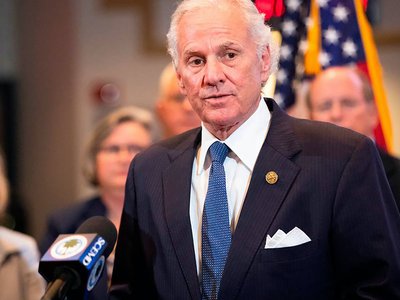Decades of life in Arkansas have taught me that education, more than any other public work, has the potential to build up communities, counties, and states. As a public servant and now as governor, I've had the unique privilege of putting our state on a path to thrive in a modern economy that grows more complex and creates new opportunities each day.
I've made it a hallmark of my administration to foster education that gives students the keys to that economy so that no one is left behind, even in the face of COVID-19. That approach is already paying dividends, but it will only continue to do so if we rely on the same foundational pillars that have underlain our strategy so far. Over the last two years, those pillars have been sometimes eroded and sometimes reinforced in ways we could never have foreseen.
The first pillar is an unshakable commitment to the fundamentals of education: an in-person education experience built around sound instruction in core subject areas from high-quality teachers. School (even well-orchestrated virtual school) isn't really school without this core experience. Arkansans should be proud that we were one of only four states to offer in-person learning throughout the last school year, in the face of stiff but well-intentioned resistance.
Along with Florida, Iowa, and Texas, we did what was right for our students in the long run, a fact that I believe will be borne out by time. The choice between in-person school — with sports, band, socializing, and teacher contact — and the isolation of remote learning was clear. And in rural areas, we went above and beyond to boost teacher pay to retain good teachers, to make sure no student was left behind on account of their zip code.
A commitment to the fundamentals, of course, goes beyond merely gathering in person. It also includes paying careful attention to those core subjects that form the basis for all learning and success. When achievement in any of those areas lags, the whole project of education is threatened and immediate action is required. Core reading and literacy skills, for example, are vital to success in the classroom, in life, and in every career path, no matter how high-tech or blue collar it may be.
When in 2017 we saw a pressing need to build stronger readers throughout our schools, we established the Reading Initiative for Student Excellence to affirm our commitment to transformative literacy education, anchored by science. By supporting teachers, bringing in community partners, and making strategic investments, we are making significant course corrections that will fuel achievement and economic growth for years to come.
Another pillar is one unique to education in Arkansas: the way that we combine our commitment to education fundamentals with a wholehearted embrace of 21st century approaches. One of the key pieces of legislation of my administration — perhaps the one of which I am most proud — is the new computer science requirements for schools across the state. These requirements have set us apart and already helped make us an attractive landing spot for innovative companies across a host of industries. Arkansas now has the largest share (89%) of public high schools offering computer science courses of any state.
For any state lagging in innovation or educational achievement, Arkansas is proof that old stereotypes and low test scores can quickly be overcome. Computer science was just the beginning of our ahead-of-the-curve approach. Even before COVID struck, broadband connectivity was fast becoming essential to educational and economic competitiveness, but many rural and low-income students were at risk of being left behind. When the CARES Act opened new opportunities for investment, we were ready, and we redoubled our efforts to bring broadband to those students.
A final pillar of our approach is a creative willingness to work side-by-side with the private sector. On projects such as connectivity and workforce training, the government cannot and should not go it alone. We need private sector partnerships to be successful; it wouldn't make sense to try to prepare students for successful careers while icing future employers out of the picture.
In mutually beneficial partnerships, private sector leaders bring both financial support and innovative frameworks, two things that excite young people to pursue 21st century careers. A perfect example of this model in action is Arkansas' new Ready for Life initiative, a workforce pipeline that provides resources — upskilling and job training, job opportunities, career information, and more — for individuals in search of employment, educators, businesses, and employment agencies. By dedicating resources to bringing together all these resources under one roof, we're best able to help students fulfill local workforce demands in meaningful careers.
I can't imagine what the future will require from our schools and training programs. But I'd be willing to bet our next generations will still need a strong mix of the fundamentals, cutting edge programs, and innovative industry partnerships. Thankfully, we're already laying the right groundwork.
Asa Hutchinson is the 46th governor of Arkansas. He was a panelist at the 2021 Reagan Institute Summit on Education.







